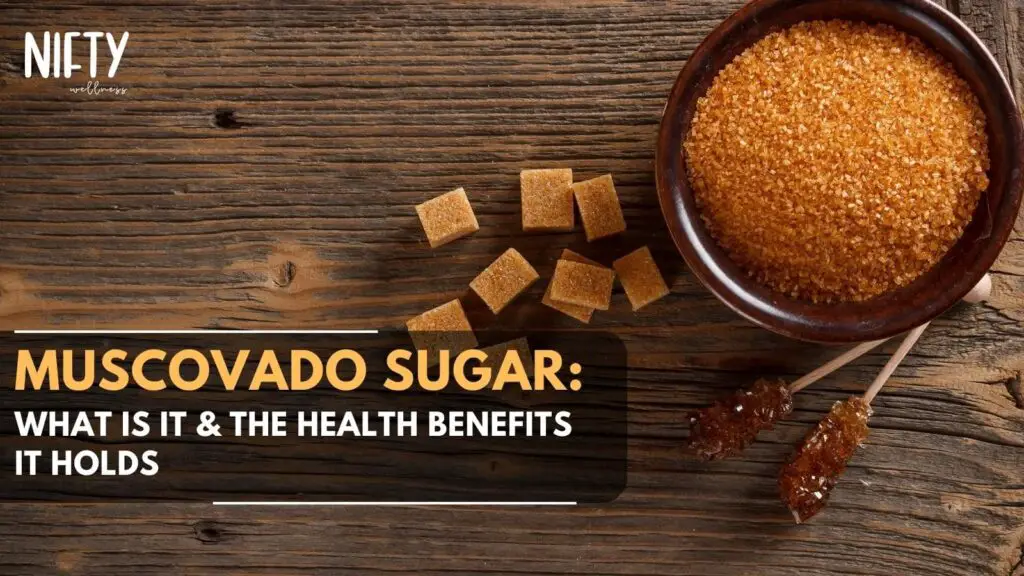Today, there are countless sugar options out on the market, from traditional white sugar to raw, unrefined sugars and even sugar-free alternatives such as Stevia. Among the many is muscovado sugar.
But what is it, and what are its benefits over the other varieties? Let’s find out!
Welcome to our deep dive into the intriguing realm of muscovado sugar! In this blog, we’re about to unravel the mysteries of muscovado sugar, discovering what sets it apart and exploring the health advantages it offers. Muscovado sugar isn’t your run-of-the-mill sweetener; it’s a natural marvel with a fascinating history and some potential health perks. So, let’s embark on this delectable journey and savour the sweetness that comes with a side of substance.
What Is Muscovado Sugar?
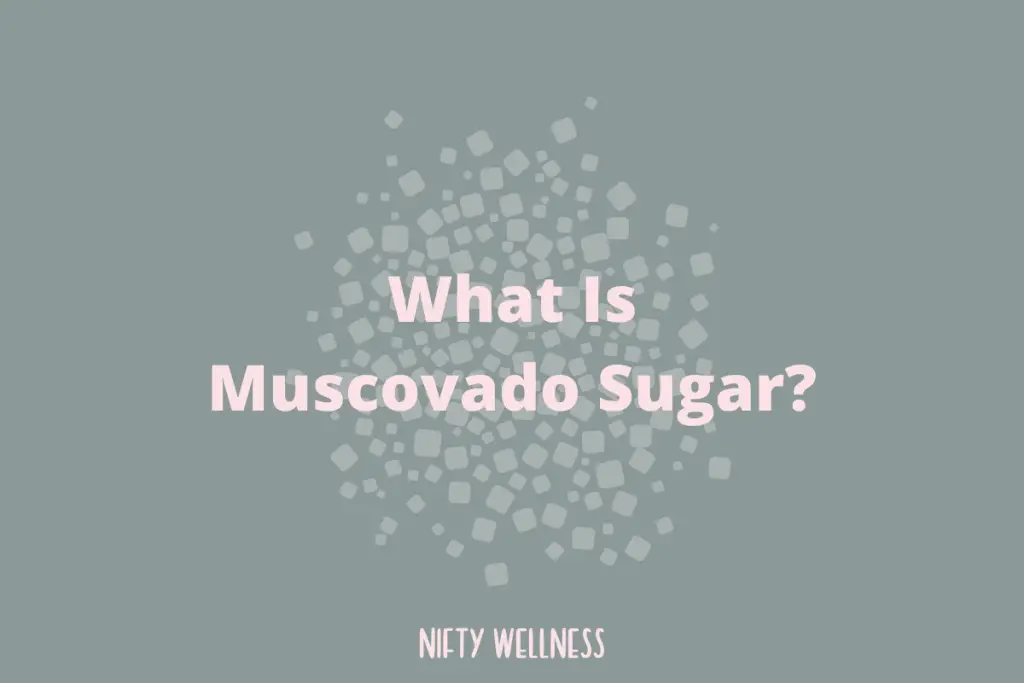
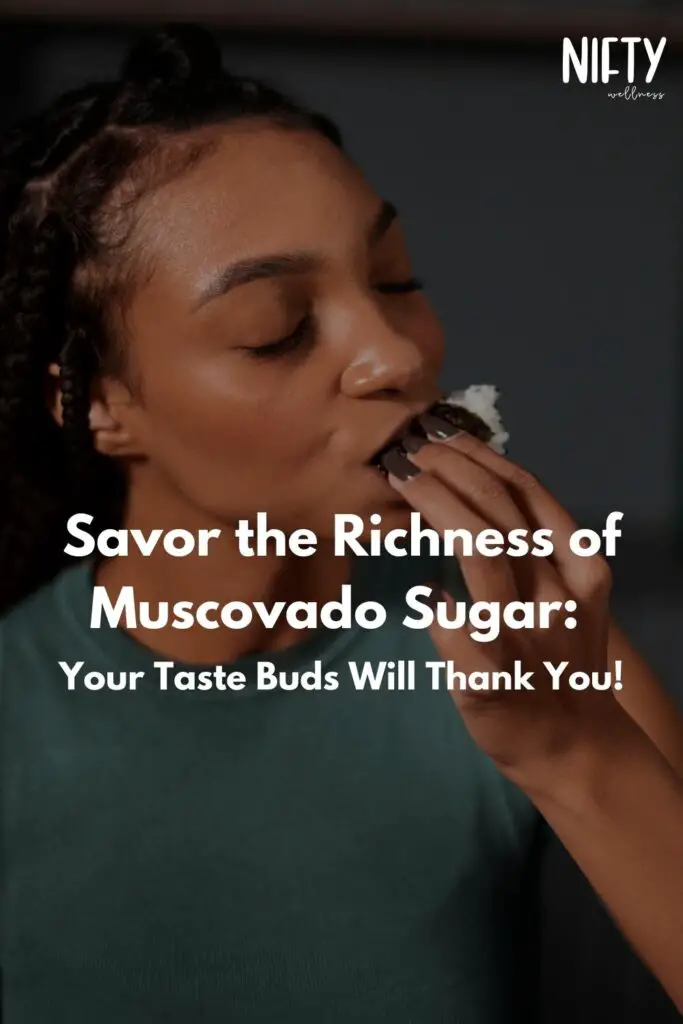
If you are wondering, what is muscovado sugar? You are at the right place for we are about to discuss what muscovado sugar is and the health benefits that it holds.
Muscovado sugar is an unrefined type of cane sugar that naturally contains high levels of molasses.
Muscovado has long been a popular sugar known around the world, often going by the name of Barbados sugar, molasses sugar, khandsari, khand, or moist sugar.
There is no molasses removed from muscovado sugar during its production process, resulting in a high moisture content.
This sugar’s rich, molasses, toffee-like flavor and soft, sticky texture (often likened to the consistency of wet sand) make it a common sweetener for chocolate, baked goods, candies, and even in savory sauces and marinades.
Muscovado is an artisanal sugar, meaning that its production methods use relatively less technology and are more labor-intensive.
However, some manufacturers remove a small amount of molasses to create a lighter variation of the ordinarily dark brown sugar.
Similar to traditional white and brown sugars, muscovado sugar contains 15 calories and 4 grams of carbohydrates per teaspoon.
Check out our blog Chesa Fruits: Nutrition & Benefits Of The Infamous Eggfruit. Delve into the goodness of this fruit, known for its health-boosting properties.
Muscovado Sugar Benefits
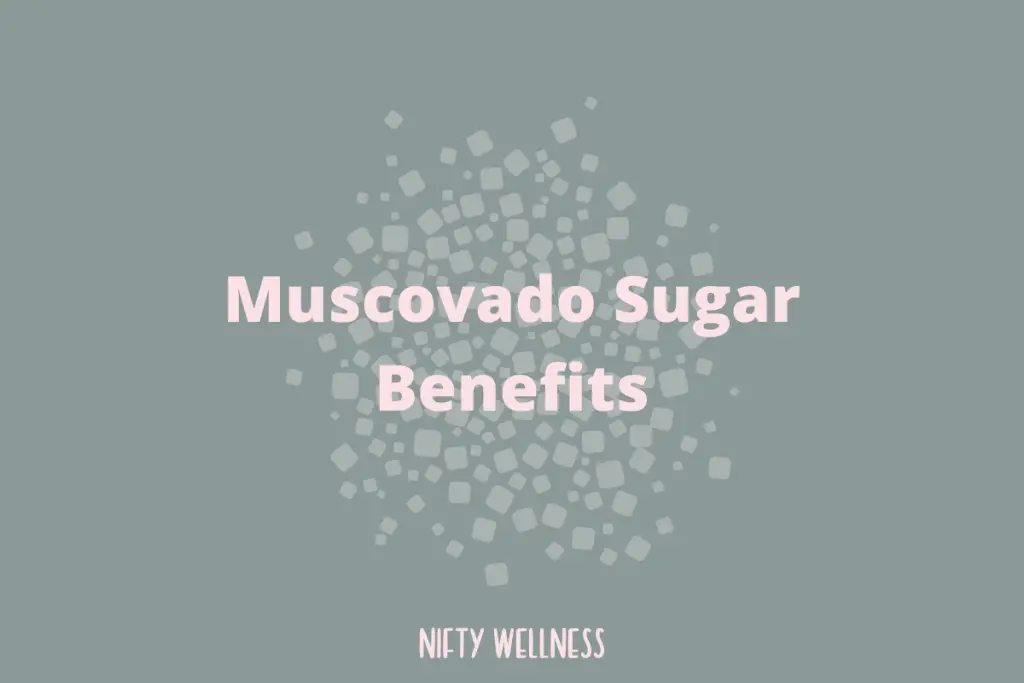

Muscovado sugar isn’t just about adding sweetness; it comes with some possible health perks, setting it apart from refined sugars. It’s a natural sweetener that offers a unique flavour and moist texture. However, as with any sugar, moderation is key when enjoying its benefits. So, let’s dive into what makes muscovado sugar a potentially better choice for your health.
High Molasses Content
The high molasses content in muscovado sugar not only contributes to its rich flavor but also provides these beneficial vitamins and minerals, making it a healthier choice compared to highly processed sugars. Muscovado’s high molasses content ensures that it contains trace amounts of vitamins and minerals, including manganese, magnesium, copper, iron, calcium, selenium, potassium, and vitamin B-6.
Though they are only a small dosage in muscovado sugar, these trace minerals play significant roles in supporting bone and heart health.
Rich in Antioxidants
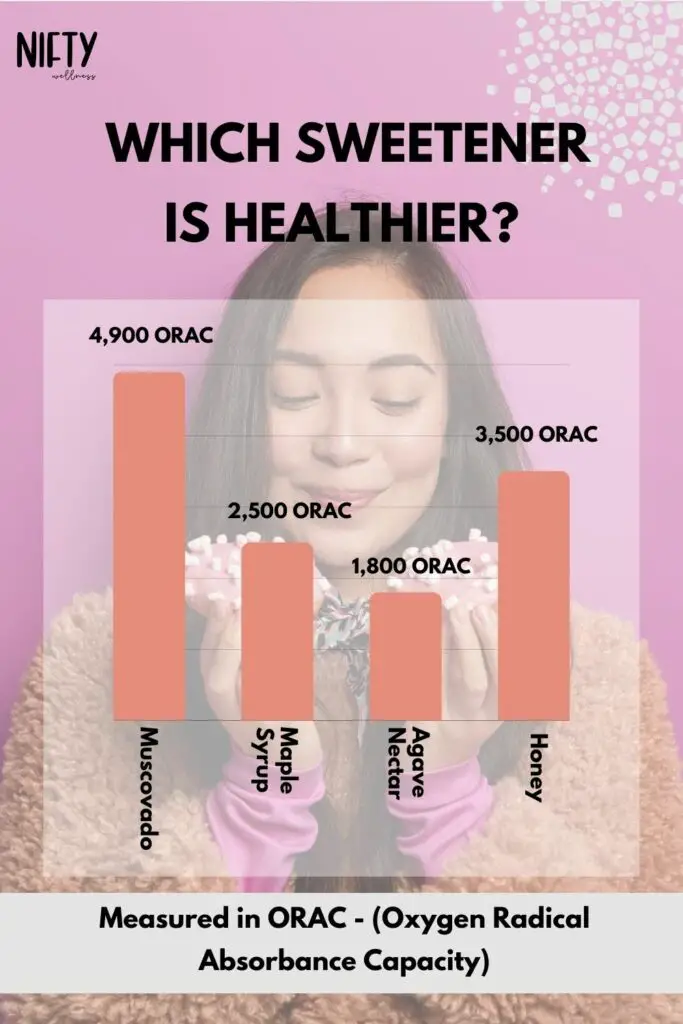
Molasses is known to contain more antioxidants than other natural sweeteners, including maple syrup, agave nectar, and several types of honey.
The molasses in muscovado sugar supports powerful antioxidants such as polyphenols, which are known to prevent cellular and free radical damage.
Though muscovado sugar contains vitamins, minerals, antioxidants and is an overall healthier sugar than refined white sugar, it should still be consumed in moderation for optimal health.
Muscovado Sugar vs Brown Sugar
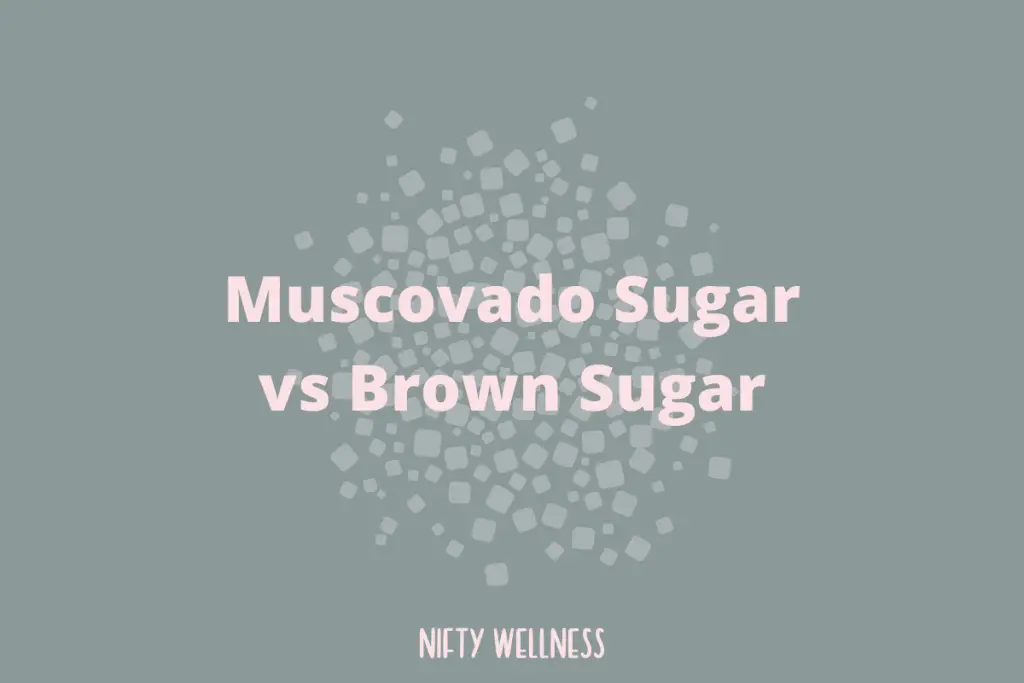
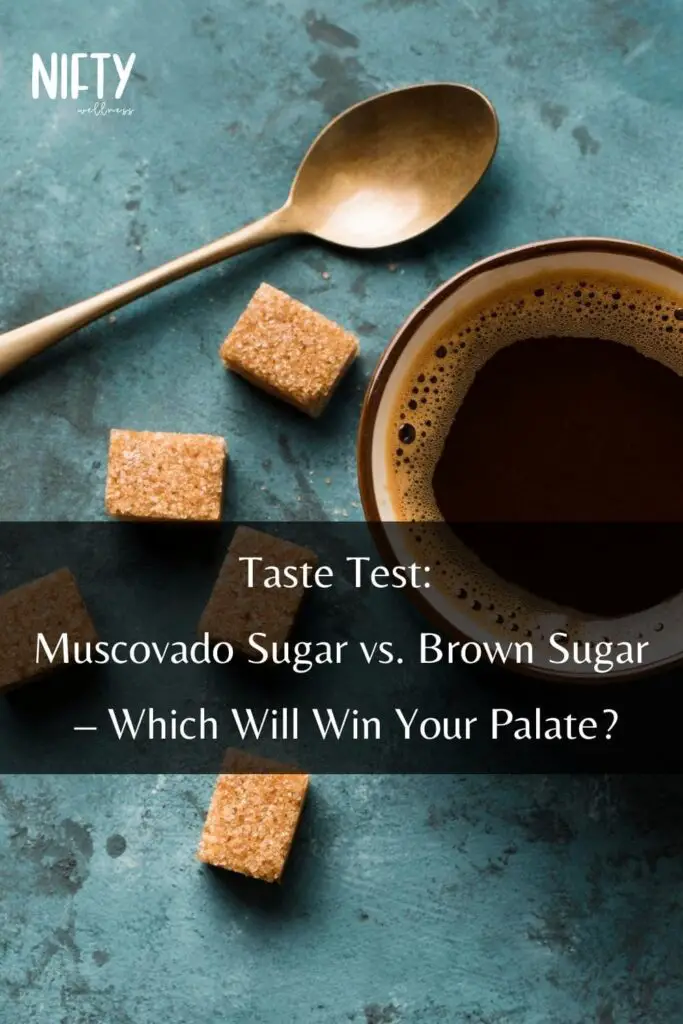
Muscovado sugar is an unrefined type of cane sugar that retains eight to ten percent of its original molasses content and can be either “light” or “dark” depending on the amount of molasses it contains.
Brown sugar, on the other hand, is a refined white sugar that has molasses added back into it.
The two differ most significantly in taste as the flavor notes in muscovado are much more complex and pronounced.
However, these two sugars can be used interchangeably (in most cases) for each other in recipes as the color and texture are very similar.
Dark brown sugar is a particularly good substitute as it can be found in nearly every grocery store and largely resembles the color and texture of muscovado sugar.
Read our blog Myomin Benefits & Side Effects: Is It Powerful. Dive into a world of health improvements with Myomin.
Muscovado Sugar Substitutes
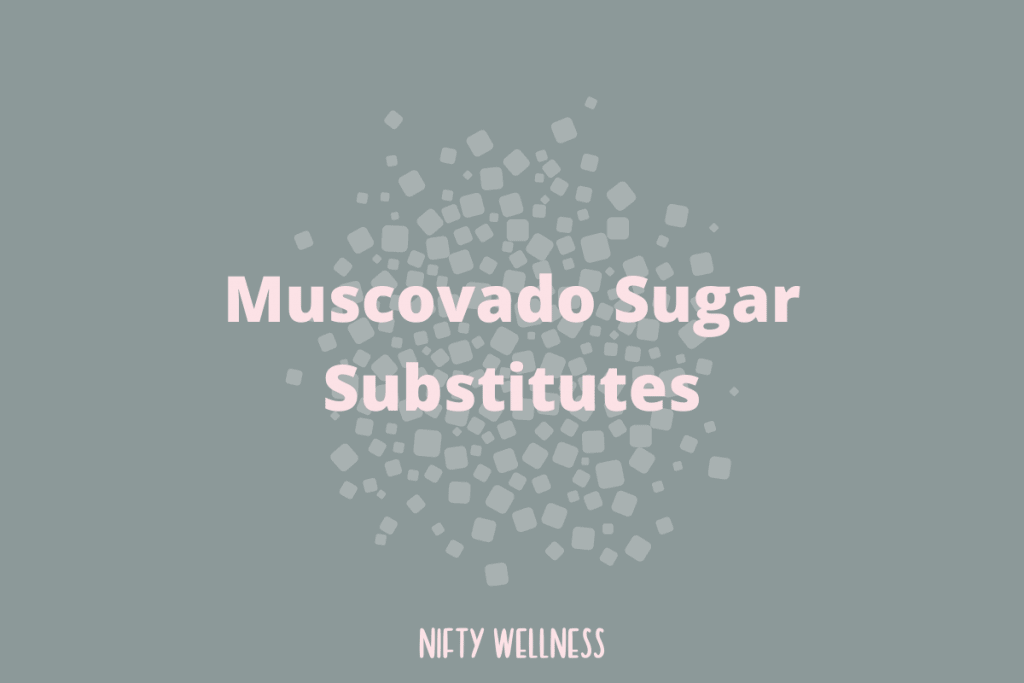

As the above section outlines, both dark and light brown sugar make good substitutes for muscovado sugar.
However, if you are looking for an unrefined sugar alternative for muscovado, unrefined, molasses-containing brown sugars such as jaggery, panela, rapadura, and Sucanat make fantastic substitutes.
These unrefined sugar alternatives not only bring their unique flavours to your recipes but also offer similar nutritional benefits as muscovado sugar, thanks to their molasses content. They can seamlessly replace muscovado in various dishes while providing a hint of distinct sweetness and a touch of richness to your culinary creations.
(You can always use honey as well, check out our article about the unique sourwood honey – in a new tab.)
Jaggery Sugar
Jaggery is a type of sugar typically made from palm, coconut, or java plants. It is a concentrated sugar commonly found in a compressed, cone-like form.
Like muscovado, it is unseparated from its molasses content and varies in color from light, golden brown to dark brown. When crumbled, this sugar can be used interchangeably with muscovado sugar in a 1:1 ratio.
Common Uses
Jaggery is most often used in traditional Asian cooking and tropical recipes. It can also be crumbled and used in oatmeal and fruit crumble recipes.
Panela Sugar
Panela is an unrefined sugar commonly used and produced in Latin America.
It is most often produced with small-scale methods that retain a higher molasses content, lending it to a more decadent caramel, molasses flavor, and golden dark brown color.
Common Uses
Panela is a common sugar to use in sweetening beverages, as well as in beer and wine-making. It is also an excellent sugar for baking.
Rapadura Sugar
Rapadura sugar is a wholesome substitute for muscovado sugar, known for its unrefined and minimally processed nature. Rapadura is an unrefined cane sugar with a high molasses content, caramel coloring, and roasted flavor. It can be used as a 1:1 substitute for muscovado sugar. Its deep, earthy sweetness makes it an excellent choice to impart complexity to your dishes when muscovado sugar is unavailable.
Common Uses
Rapadura is commonly used to sweeten hot beverages such as tea and coffee. Like muscovado, rapadura is a fantastic sugar to use in sauces, glazes, dressings, and marinades.
Sucanat Sugar
Sucanat is an unrefined sugar made from crystallized pure cane sugar. Sucanat has a higher proportion of molasses (similar to muscovado) than other cane sugars.
Its flavor is best for spicier, more complex baked goods such as ginger cookies and spice cakes.
Common Uses
Sucanat is a great sugar for baking gingerbread, decadent chocolate desserts, sweetening beverages, and using it as a substitute for brown or white sugar.
Conclusion
In conclusion, muscovado sugar is a unique and unrefined sweetener that not only enhances the flavour of your favourite recipes but also offers some health benefits thanks to its high molasses content and rich array of trace minerals. While it’s a remarkable choice, it can sometimes be a bit challenging to find. The good news is, if you’re looking for substitutes, both dark and light brown sugar can fill in admirably.
Additionally, for those seeking unrefined alternatives, jaggery, panela, rapadura, and sucanat are fantastic choices to infuse that delicious complexity into your culinary creations. So, whether you’re a passionate baker or simply enjoy a touch of sweetness in your dishes, exploring these sugar options can add a delightful twist to your culinary adventures.
Frequently Asked Questions

Is Muscovado Sugar the Same as Brown Sugar?
While the two are very similar (due to appearance, texture, molasses content) and can often be used interchangeably, muscovado sugar is not the same as brown sugar.
Can You Make Your Own Muscovado Sugar?
You cannot make pure muscovado sugar unless you own and run a sugar refinery. However, you can make a similar brown sugar at home by mixing dark molasses with white sugar.
A 1:3 ratio of molasses to sugar will give you a richer, darker brown sugar, while a ratio of 1:6 will provide a light brown sugar.
Tip: If you’re trying to create a muscovado sugar substitute, remember the consistency of muscovado is similar to that of wet sand.
How Do I Store Muscovado Sugar?

Like other brown sugars, muscovado has a high moisture content and needs to be stored in a cool area and in an air-tight, rust proof container to avoid drying out.
A trick to keeping your brown sugars moist and softened is to place a piece of fresh bread in the container along with the sugar.
Is Muscovado Sugar Healthy?
Though muscovado sugar contains higher levels of vitamins, minerals, and antioxidants than other sugars, it still is sugar.
An intake of sugar has been linked to spikes in blood sugar, weight gain, non-alcoholic fatty liver disease, inflammation, diabetes, higher blood pressure, and diseases such as heart disease.
Is Muscovado Sugar Vegan?
When producing and refining sugar, bone char (from cattle bones) are used to filter sugar, mainly white sugar.
Muscovado sugar and other unrefined or raw sugars are considered vegan because they do not go through refining processes using bone char.
Is Muscovado Sugar Keto Friendly?
The goal of a ketogenic diet is to decrease the amount of insulin the body produces in order to start burning stored body fat. Thus, you want to avoid high glycemic sweeteners and carbohydrates that spike insulin levels.
Muscovado sugar, molasses, and brown sugar are all high glycemic sweeteners that those on a Keto diet will want to avoid.
How Do I Use Muscovado Sugar?
Muscovado is a great sugar to use in marinades, sauces, salad dressings, meat glazes, chutney, or sweetened hot drinks due to its high moisture content and rich flavor.
Muscovado also pairs beautifully with chocolate and can be used in cakes, brownies, cookies, ice cream, and other baked goods. It can also be used to create toffees, caramels, gingerbreads, or sweeten popcorn and oatmeal.
What Is the Difference Between Muscovado Sugar And Demerara Sugar?
Like muscovado sugar, demerara is a type of raw cane sugar. It has a toffee flavor, light amber color, large grain size, and can also be used as a brown sugar substitute.
While not all of the molasses is removed from demerara, it has a lower moisture content and dryer texture compared to muscovado.
What Is the Difference Between Light Brown Sugar And Dark Brown Sugar?
The main difference between light and dark brown sugar comes down to one simple ingredient: molasses.
Dark brown sugar contains more molasses than light, giving it slightly more moisture and stronger caramel flavor notes.
Can You Substitute Dark Brown Sugar For Light Brown Sugar In A Recipe?
When a recipe calls for “brown sugar,” it refers to light brown sugar. However, dark brown sugar can be substituted for light brown sugar if that’s all you have.
Be mindful of how dark brown sugar may affect the recipe’s taste and rise as dark brown sugar has more moisture, a deeper flavor, and a darker color.
Can I Use Dark Muscovado Sugar Instead Of Light?
In general, using dark muscovado sugar instead of light is okay!
Just be aware of how this could affect the outcome of the recipe: dark muscovado sugar is more complex and has a deeper, more robust flavor and could affect the texture of the final dish.
